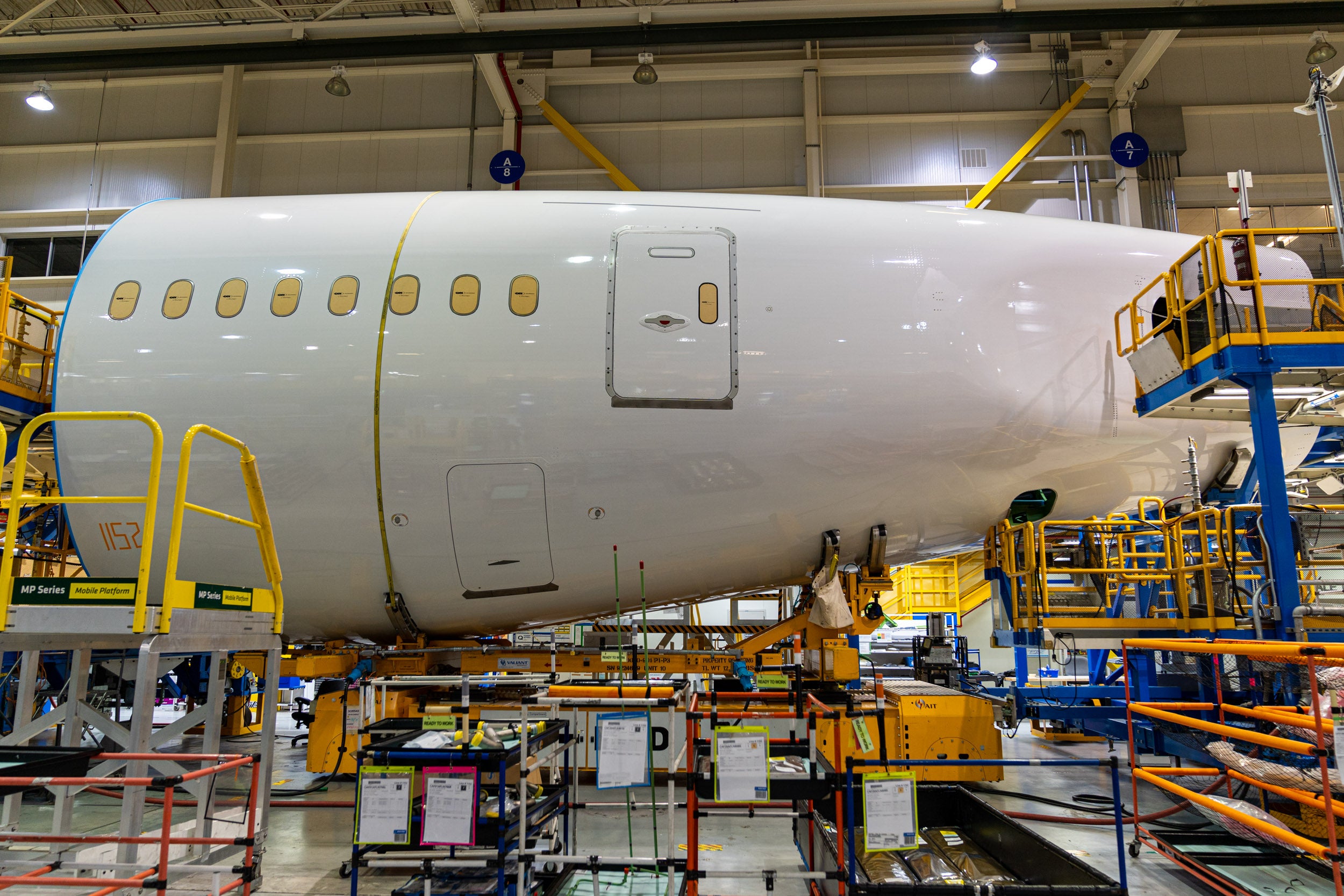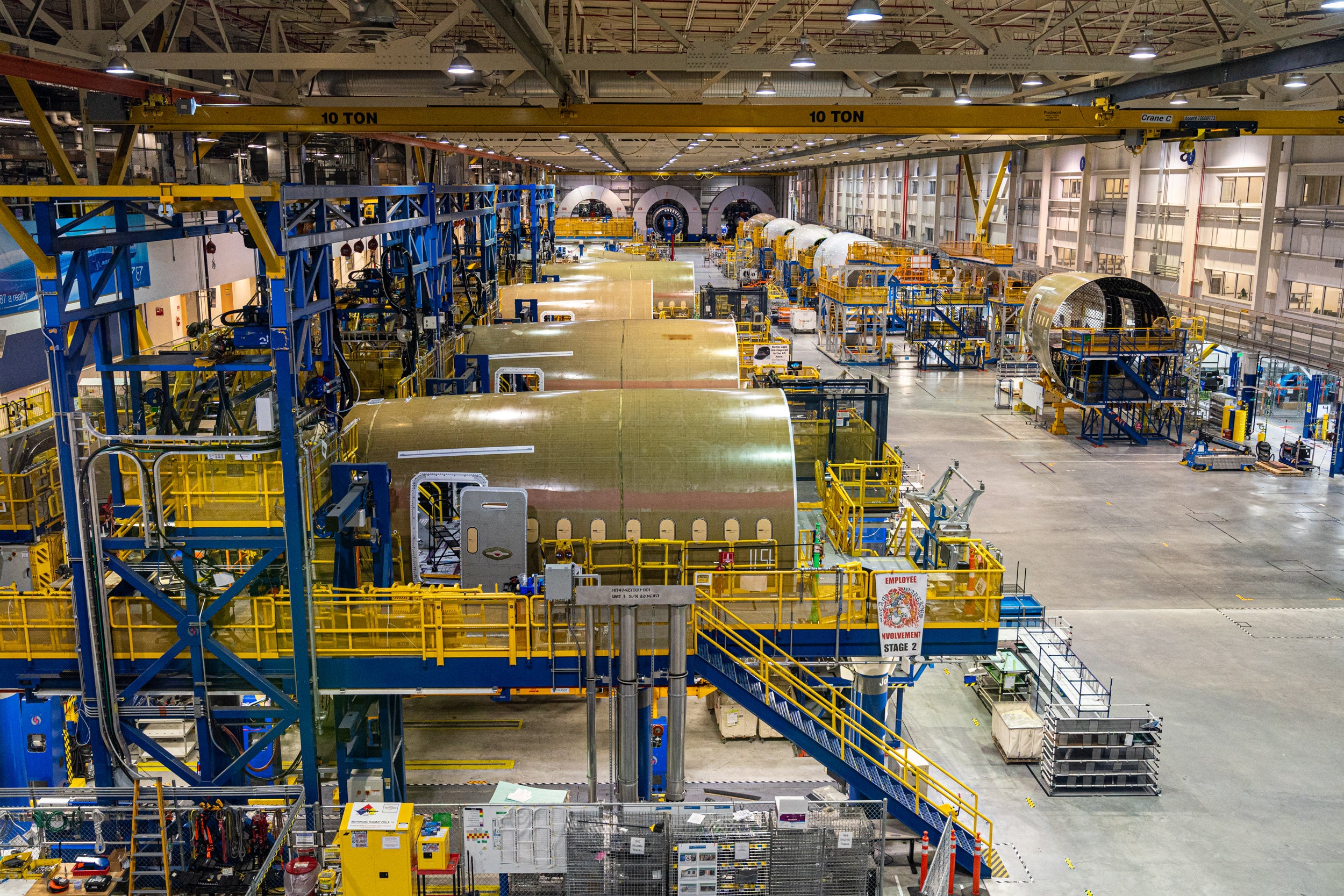Boeing mounted a vociferous defense of its 777 and 787 Dreamliner wide-body programs Monday, days after a whistleblower alleged that the plane-maker had taken manufacturing shortcuts that introduced potential structural flaws to both aircraft types.
On Monday, Boeing held an unusual media briefing from its Dreamliner assembly plant in North Charleston, South Carolina, where it detailed the specifics of how it assembles the 787 from several parts that are built and delivered disassembled, such as the fuselage, wings and tail section, and the structural testing each component undergoes.
In refuting the allegations and characterizations presented by the whistleblower, Boeing offered a sharp contrast from the conciliatory and concessional tone it’s presented this year through the ongoing 737 MAX crisis, which ultimately led to the ousting of the company’s CEO.
Want more aviation news? Sign up for TPG’s free biweekly Aviation newsletter.
The whistleblower, a Boeing engineer named Sam Salehpour, alleged last week that hundreds of 787 and 777 jets were at risk of structural failure from damage caused by fatigue. The allegations were detailed in The Seattle Times.
He also said that he was harassed by Boeing as a result.
Salehpour’s 787 allegations surrounded tiny gaps between fuselage sections that remain after Boeing joined them together.
The spaces were first discovered in 2020, which led Boeing to halt deliveries of the long-haul jet for nearly two years. The Federal Aviation Administration investigated Boeing’s manufacturing program and approved a fix, and currently inspects each individual 787 before approving it for delivery to an airline customer.
Salehpour alleged, however, that the problem was not actually fixed, and that Boeing used excessive force to push the pieces together, making it appear as if the gaps were gone, rather than using small pieces of filler material to fill them — a practice known as “shimming.”

Shimming is used to fill gaps larger than five-thousandths of an inch, which prevents pieces from moving around during flight and bearing excess stress.
On the 777, Salehpour alleged that fuselage panels were delivered from a vendor that did not fit properly, and said that factory workers jumped on pieces of the fuselage to jam them into place, potentially deforming them. He claimed that he was moved to the 777 program as retaliation after raising concerns about the 787.
Boeing last week was quick to refute Salehpour’s claims by arguing that all of its 787s meet specifications required for certification.
“These claims about the structural integrity of the 787 are inaccurate and do not represent the comprehensive work Boeing has done to ensure the quality and long-term safety of the aircraft,” Boeing said in a statement last week provided to TPG. “The issues raised have been subject to rigorous engineering examination under FAA oversight. This analysis has validated that these issues do not present any safety concerns and the aircraft will maintain its service life over several decades.”
On Monday, Boeing engineers outlined the production process in specifics, including the stress testing that it says proves everything on the 787 is within its specified parameters.
“Extensive design analysis and testing that validates all of the decisions we’ve made,” said Steve Chisholm, a vice president and functional chief engineer of mechanical and structural engineering at Boeing.
Chisholm also said that Boeing encourages employees to speak up about problems or concerns they observe, and said that such reporting is key to the company’s safety processes.
“Having the voices of our employees heard is of utmost importance,” he said. “We do believe this makes us stronger. And it’s something we’ve really been leveraging and emphasizing.”

In addition to an ethics hotline, Boeing employees can use a system called “Speak Up” to report issues anonymously, Lisa Fahl, a Boeing vice president of airplane programs engineering, said Monday.
“You have full visibility to the FAA, and that’s a system where we go through and we do an investigation and an evaluation must be performed and documented to support anything that’s brought forward,” she said.
The FAA is investigating Salehpour’s claims, according to The New York Times.
In response to questions from TPG, an FAA spokesperson said that the agency continued to enforce its prescribed fixes for the shimming issue, which includes issuing ongoing Airworthiness Directives (ADs) regarding inspection and repairs, along with inspecting all newly built aircraft before they are delivered.
“Every aircraft flying is in compliance with the ADs. Boeing has either completed or is working on long-term corrective actions. The FAA continues to issue Airworthiness Certificates for every Boeing 787 before they enter service.”
An FAA spokesperson also noted that Boeing investigates all whistleblower reports.
“Voluntary reporting without fear of reprisal is a critical component in aviation safety,” the spokesperson said. “We strongly encourage everyone in the aviation industry to share information.”
The background: What to know about the Boeing 737 MAX 9 and the MAX series
The report comes amid a mounting crisis surrounding Boeing’s quality control on its narrow-body 737 program, stemming from a Jan. 5 incident in which a body panel burst off an Alaska Airlines 737 MAX 9 during a flight a few minutes after it departed from Portland International Airport (PDX) in Oregon.
Boeing CEO Dave Calhoun said he would step down by the end of the year, while commercial airplane chief Stan Deal resigned last month.




